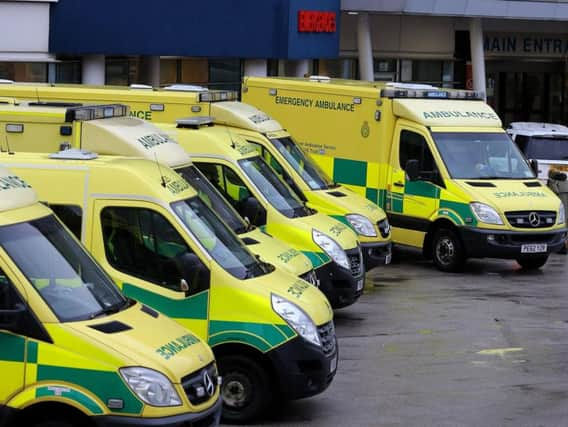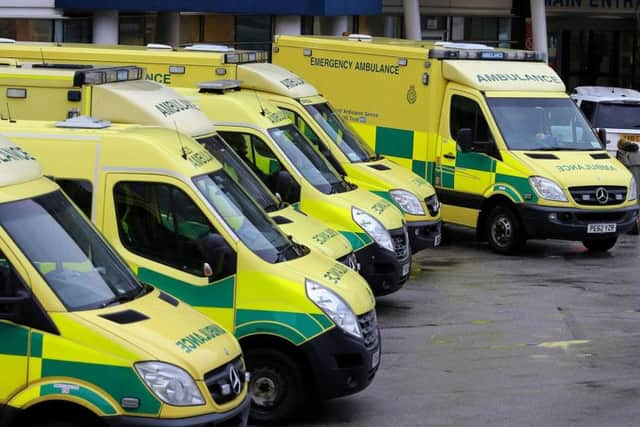Wigan paramedics 'up in arms' over 'dangerous' working hours plans


Staff are reportedly “up in arms” about North West Ambulance Service’s proposal to tackle a sharp rise in call-outs.
The GMB union has already walked out of talks over the plans, while Unite said its discussions with NWAS bosses are hanging “by a thread”.
Advertisement
Hide AdAdvertisement
Hide AdNWAS said the changes follow a review of the service that, coupled with an £8.2m investment, will mean an extra 7,821 ambulance hours a week across the North West.


But the unions say non-urgent crews are being re-purposed outside peak times to meet demand, rather than adding new services.
Unite representative Neil Cosgrove perdicted that the changes will make things worse for paramedics and the public, saying workers had “lost faith”.
“Staff are up in arms about it,” he added.
“It will have an impact on their work-life balance as well as financial impact for not working unsocial hours.
Advertisement
Hide AdAdvertisement
Hide Ad“It’s reduced cover for areas, which means people in those areas will get less cover.
“The (review) established between 8am and 2am as the peak time for resources to meet demand but we don’t have the resources on the current structure to meet that.
“I honestly don’t know how people manage.”
It follows recommendations by the Operational Research in Health (ORH) and Working Time Solutions to “provide the most effective use” of NWAS’s resources, with the hope of creating “a more balanced workload to become more in line with our patients’ needs while also attempting to reduce wait times”.
The review shows it needs 44,282 ambulance hours per month, with figures from April 2018 showing it only has capacity for 36,461.
Advertisement
Hide AdAdvertisement
Hide AdGMB and Unite have predicted “major problems” with overhauling shifts to cover demand during peak times, calling the proposals “dangerous”.
They say it would see Wigan lose 53 hours of ambulance services every week while Preston and Morecambe would lose 174.
Greater Manchester as a whole could lose 237 hours a week, they say. For the overall North West, they predict 1,961 hours of services will be lost every week.
NWAS has said while coverage would be reduced in some areas, others would see an increase. The current situation was “no longer sustainable”, a spokesman added.
Advertisement
Hide AdAdvertisement
Hide AdIn a newsletter to members, GMB explicitly said that the loss of cover in areas “is unsafe and will put patients at risk”.
Mr Cosgrove said some paramedics work 12 hour shifts over 13 shifts a month to save costs on child care – but that may not be possible under the new system.
He added: “Some might want to work eight, 10, 12 hours, or a mix. That’s how it was sold to us as long as it meets service demand. But now it has turned on its head... staff now need to fit in to demands.
“What’s going to happen with sorting extra child care? None of that has been discussed - it should have already at this point.”
Advertisement
Hide AdAdvertisement
Hide AdGMB predicts that the change in hours could result in a pay cut for “many staff of at least four per cent”.
Mr Cosgrove, who said formal talks with NWAS over the plans are continuing “but only by a thread”, said he is also aware of some paramedics already looking for alternative employment.
He added: “We thought it was better to be around the table to find out the facts. We want to know the information - but we aren’t getting it all.”
Unite is set to discuss the issue at its meeting on August 19 with GMB following suit at its meeting on August 27.
Advertisement
Hide AdAdvertisement
Hide AdNWAS was unable to confirm to the Post which ambulance stations would be affected, and how, by the working hours shake up.
A spokesman said: “The rota review is across the region – all stations will see changes on way or another.
“Because of trade union concerns, we are revisiting the hours and so don’t have any agreed figures per station as yet.”
An NWAS spokesman said: “The review takes the opportunity to include an additional investment of circa £8.2m from our commissioners which will provide an additional 7,821 emergency ambulance hours every week across the North West.
Advertisement
Hide AdAdvertisement
Hide Ad“This investment and review is vital in order for us to meet our demand – since the trust formed in 2006, there has not been a review of rotas across the region and the current variations in shifts is no longer sustainable.
“The project is being undertaken with full consultation with staff, some of whom are acting as volunteers to help design the rotas via working party groups. The designing of the rotas uses both the findings of the research and the feedback from staff. Once a set of rotas are approved, staff will then be able to vote on which they wish to be implemented in their own locality – this will include a mix of 8, 10 and 12 hours which will give staff greater flexibility and choice.
“We acknowledge that while some night hours are lost in areas where there is low activity at that time, there are also areas where night hours are gained. Following feedback from trade unions on this aspect, we are revisiting some of the proposed night time hours. Staff who work nights are entitled to an unsocial hours payment but as yet, we do not have a figure as to what any changes might be in terms of potential earnings.
“Should this occur, staff affected will be individually consulted with. Our patients are our priority and we want to provide the best possible care to the people of the North West.
Advertisement
Hide AdAdvertisement
Hide Ad“With a more effective rota system we will seek to realise our vision of being the best ambulance service in the UK by delivering the ‘right care, at the right time and in the right place; every time’ for all patients.”